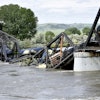Federal workplace safety officials and a top chemical industry group last week announced a partnership to raise awareness about the use of hazardous chemicals in the production of polyurethanes.
But some observers reportedly suggested that the initiative could have an ulterior motive: undermining new limits on the materials under consideration by California regulators.
The Occupational Safety and Health Administration and three groups under the American Chemistry Council — the Center for the Polyurethanes Industry, a diisocyanates panel and an aliphatic diisocyanates panel — plan to collaborate over two years to educate employers and workers "on how to use diisocyanates safely in their everyday working environment," said Sahar Osman-Sypher, who directs the diisocyanates panels.
Diisocyanates and other isocyanates are used to make a wide range of polyurethane products, from insulation and adhesives to shoes and mattresses. But exposure to the compounds can cause skin irritation, breathing problems and other health issues. Longer-term exposure can lead to asthma or death.
“We’re thrilled to be working with OSHA on making American workplaces even safer, which has always been a top priority for CPI and ACC as a whole,” added Lee Salamone, senior director of the CPI.
The dangers of isocyanates, however, prompted California regulators to pursue stricter limits on select chemicals in spray polyurethane foam. Some health experts told Chemical & Engineering News that the federal efforts could interfere with California's moves.
University of Michigan environmental health scientist and former OSHA official Adam Finkel told CE&N that the partnership wasn't necessarily bad since the agency lacks the resources to oversee all potentially dangerous workplaces.
"It should be doing whatever it can to incentivize private parties to do some of its work" Finkel said. "But this alliance concept is the least useful and most frivolous way it could go.”
OSHA, ACC Form Diisocyanates Partnership
Federal workplace safety officials and a top chemical industry group last week announced a partnership to raise awareness about the use of hazardous chemicals in the production of polyurethanes.
Sep 20, 2017
Latest in Safety





















